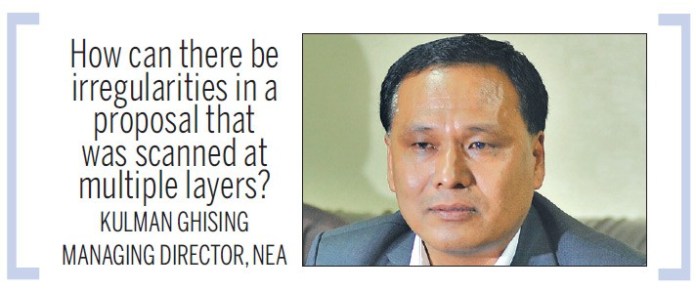May 10, 2017-
Nepal Electricity Authority (NEA) Managing Director Kulman Ghising on Tuesday defended the government decision to buy LED bulbs from India’s Energy Efficiency Service Limited (EESL) and challenged the private sector to supply the products at a cheaper rate than what the state-owned power utility has proposed.
The NEA is planning to purchase 20 million units of LED bulbs from India’s state-owned EESL and resell them to Nepali consumers.
The power utility is planning to procure these bulbs at around Rs104 per unit from EESL and resell them to Nepali consumers at Rs135 to Rs140 per unit after levying customs duty, value added tax and marginal handling cost.
But the proposal ran into controversy after some said the government was paying “a lot” to purchase the LED bulbs.
At a press meeting on Tuesday, Ghising, who is largely credited for eliminating power cuts from the Capital and other major cities, even broke down in tears for suspecting the government’s move of buying LED bulbs from the Indian company.
He also challenged the private sector involved in trading of LED bulbs to provide the products of Philips, Osram or any equally good brand at up to Rs150 per unit. “If vendors are able to supply LED bulbs at that rate, the NEA will allow them to supply the product,” said Ghising at a press conference in the Capital.
“We will also allow those vendors to use 200 sales counters of the NEA and provide other logistics support, including human resources,” Ghising added.
The NEA is procuring the LED bulbs and selling them to its 3.5 million customers in a bid to replace CFL and incandescent bulbs that are widely being used by households. Such replacement, as claimed by the NEA, will save around 200 MW of energy during the peak energy consumption hours.
The authority’s proposal to procure such bulbs directly through the Indian state-owned company was approved by last week’s Cabinet meeting. The green signal extended by the Cabinet stirred a controversy with some reports claiming massive irregularities in the procurement process.
Ghising, however, dismissed such reports of irregularities and said the decision to procure such bulbs from India was made during the third and fourth Nepal-India energy secretary level Joint Steering Committee meetings in June 2016 and February 2017.
“India has appointed EESL to initiate the process of implementing the decision made during those meetings,” said Ghising. Based on this mandate, EESL sent the proposal to its concerned ministry. The proposal was later forwarded to Nepali ministries of foreign affairs and energy.
“How can there be irregularities in a proposal that was scanned at multiple layers?” questioned Ghising. “Instead, the NEA is involved in this procurement to provide quality bulbs to customers at a low price,” he said, adding, “The market price of LED bulbs we are importing stands at around Rs400 per unit.”
The decision to purchase LED bulb directly from the Indian government, according to Ghising, was made considering the lengthy bidding process which could take as long as a year.
“We need to manage electricity load before the onset of the next dry season, which begins in less than a year,” he told mediapersons. “This intervention to replace the incandescent and CFL bulbs will significantly reduce the electricity demand for lighting purpose.”
Source: The Kathmandu Post











